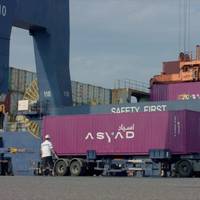Asyad Looks Abroad for Possible Expansion

Oman's state-owned Asyad is considering buying ports and terminals abroad and could divest assets outside its core logistics business, such as a college and project management operation, its chief executive said on Thursday.The plans by the company, which is owned by the Oman Investment Authority, align with the small oil producing Gulf state's broader strategy to reduce reliance on crude revenues and expand its non-oil industries.Chief Executive Abdulrahman Salim Al Hatmi told…
INSIGHTS: Niels Aalund

Niels Aalund was elected President of the International Propeller Club at their 93rd International Convention and Conference. The prominent maritime industry stakeholder will serve a two-year term, commencing from October 17th. Aalund, a well-known maritime subject matter expert and executive, also serves as an Officer and as Senior Vice President of the West Gulf Maritime Association (WGMA). WGMA communicates and coordinates with various governmental entities throughout the West Gulf…
Maersk Introduces BAF Formula
Maersk Line is pleased to introduce a new formula for our floating BAF (Bunker Adjustment Factor). Bunker prices have tripled within the last three years and bunker costs now constitute nearly half of the total vessel costs, up from 20% ten years ago. Maersk Line has built the BAF formula on principles that are common in other transportation industries like airlines and parcel services. In these industries, prices and rates reflect fluctuations in fuel prices, and customers accept this as part of doing business in an industry, which is very reliant on fuel. The formula builds on elements such as fuel consumption, transit time, and imbalances of container flows. However, only changes in the oil price will entail changes in the BAF level.
Rotterdam Port Growth Continues
In 2005, 369 million tonnes of cargo passed through the port of Rotterdam, almost 5% more than in 2004 and a new record. The volume of cargo leaving the port grew faster than that of cargo coming in, with 9% and 3% respectively, with general cargo enjoying 7% growth – almost twice the growth of bulk cargo. Ores and scrap metals (-5%), crude oil (-1%) roll on /roll off (-9%) and other general cargo (-3%) arrived and left in smaller volumes. However, handling of agri-bulk (+1%), coal (+7%), other dry bulk (+4%), other wet bulk (+4%), mineral oil products (+27%) and containers (+10%) showed very positive figures. In numbers, container movements increased by more than 12% to 9.3 million TEU (container units of 20 feet).






